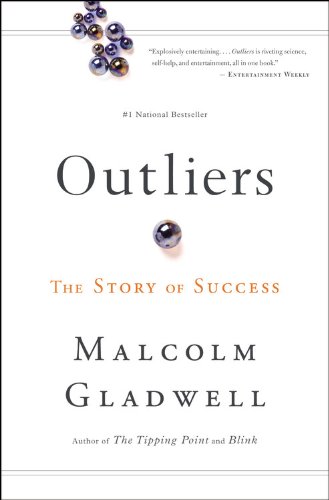All Nonfiction
- Bullying
- Books
- Academic
- Author Interviews
- Celebrity interviews
- College Articles
- College Essays
- Educator of the Year
- Heroes
- Interviews
- Memoir
- Personal Experience
- Sports
- Travel & Culture
All Opinions
- Bullying
- Current Events / Politics
- Discrimination
- Drugs / Alcohol / Smoking
- Entertainment / Celebrities
- Environment
- Love / Relationships
- Movies / Music / TV
- Pop Culture / Trends
- School / College
- Social Issues / Civics
- Spirituality / Religion
- Sports / Hobbies
All Hot Topics
- Bullying
- Community Service
- Environment
- Health
- Letters to the Editor
- Pride & Prejudice
- What Matters
- Back
Summer Guide
- Program Links
- Program Reviews
- Back
College Guide
- College Links
- College Reviews
- College Essays
- College Articles
- Back
Outliers: The Story of Success by Malcolm Gladwell MAG
As the cover describes, Malcolm Gladwell's Outliers: The Story of Success follows the trend of his past books and changes the way we look at things. Here the reader is shown the incredible patterns behind success. The book uses a similar format where Gladwell introduces an idea, and then gives details to prove its validity. Tables and charts are occasionally used to help illustrate a pattern.
Part one introduces the extraordinary opportunities given to the Beatles, Bill Gates, and anyone who is successful. Part two examines how cultural legacies impact success. Each chapter details a different advantage that can determine whether or not you will be successful.
Not only is the topic intriguing, but Gladwell's writing at times really brings the stories to life. Often, he uses quotes or research to find a flaw, destroying your preconceived notions about how to be successful. Other times, Gladwell acknowledges potential disbelief and uses even more examples to prove his points. For example, in chapter two he talks about how, in order to be good at something, you need to practice for 10,000 hours, which he calls “the magic number for true expertise.” Popular examples like Bill Gates and the Beatles are shown to have had the opportunity to practice for 10,000 hours before they became famous.
Outliers could be a great book. Unfortunately, Gladwell seems content to just make it good. In the second half, many ideas from previous chapters are reiterated. Other parts are too long. Chapter two, while making good use of examples, spends too much time on the concept.
The other problem I found is that Gladwell falls prey to the fallacy of complex cause. Sometimes, he will refer to success as something that is gained only with opportunity or background. While this may not have been his intention, Gladwell sometimes comes across as saying ambition and skill have little part in success; in other words, anyone with the right opportunity or background can be successful.
Make no mistake, Outliers is a good book. Gladwell is a great author who is able to make a nonfiction book interesting, even if you dislike nonfiction. However, parts of it fail to live up to the potential of the better chapters.
Similar Articles
JOIN THE DISCUSSION
This article has 0 comments.

